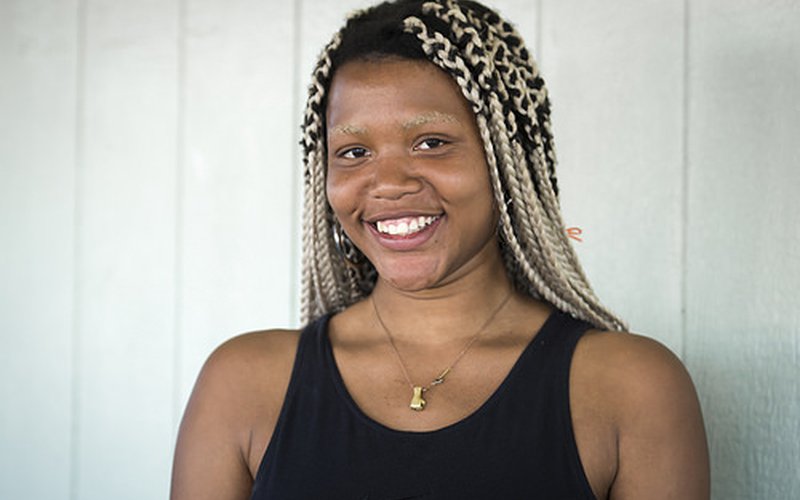
Seattle emcee DoNormaal offers surprise after lyrical surprise in the tightly packed, staccato rhymes brimming on her latest LP, Third Daughter. The rapper, who burst on the Emerald City scene in November 2015 with the release of her beloved first full-length Jump Or Die has maintained status as one of Seattle’s most sought-after spitters. With her latest, DoNormaal’s star continues to rise. But for the oft-introverted rapper, what do these recent changes signal for her future? And how did this career first begin to take shape? To answer these questions, and others, we caught up with the rapper over Labor Day weekend to talk past, present, and hopeful future. Hear an exclusive live session from DoNormaal on Sunday, October 1st at 6:30 PM PT on Street Sounds on KEXP.
How did you discover hip-hop?
Growing up, music and pop culture were always a big part of my home culture. Our mom was into all that funky '70s stuff, like Michael Jackson and The Jackson 5, the Commodores, and she loved The Beatles. My grandparents also love hymns and gospel music. And then my twin sister and I have three older siblings that range between 4- and 11-years-older than us so we were growing up with a lot of teenagers around. There was always that older kid influence. From a very young age, we were watching MTV and listening to what they were listening to. I grew up listening to everything from Brian McKnight to 2Pac, Prodigy, Destiny's Child, Mase, Daft Punk, ABBA, Aaliyah, Charlotte Church to Wu Tang.
But there was one specific moment when I became really obsessed with hip-hop and that was when I was like 10. One of my older sisters used to sleep with the TV on all night tuned to MTV. Sometimes I’d wake up in the middle of the night and go in there if I couldn’t sleep. It was really comforting to me because the TV would be on and a fan would be going but she’d be knocked out, just snoring in the glow and the noise of it all. I went in there one night and the video for "On My Block" by Scarface was playing. It was very emotional and very hip-hop. He’s speaking about where he comes from and who he does it for and the video paints such a strikingly vivid and beautiful picture of that. I just started crying and crying. And there was a little star shining in the sky out of the window as it was slowly starting to get light outside and I just kept looking at the star.
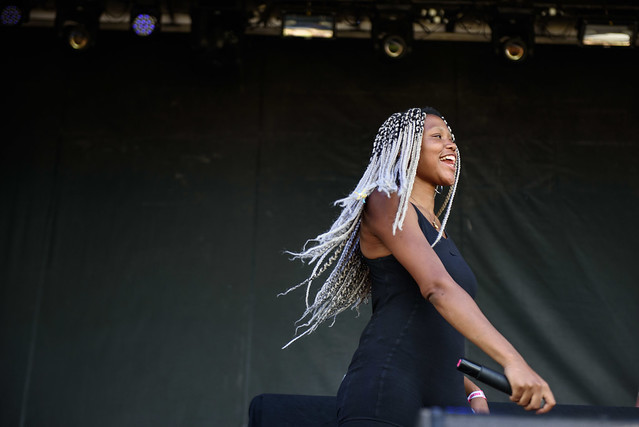
When did you start rapping?
I didn’t start rapping seriously until I got to college. I’d been making up rhymes and ditties since I could talk, but it was just all fun and games and improvisation with myself or my sisters and friends. I never once considered I could do it as a career until I was much older. I think it was my dream to do it way deep down but I didn’t have many examples of professional musicians in my life at that time. I was disconnected from that dream but I knew had it at the same time. It didn’t seem like something I could do. It seemed unattainable regardless of the fact that I had so much fun doing it and was good at it. I think maybe I was so good at it and so meant to do it that it scared me because it's not what I expected for myself. I thought of myself as a writer and a poet. That's the same as being a musician in a way, but for some reason, it felt different to me. I always wanted to be on the world stage, but writer or poet seemed more understated than what I do now, and because I was so incredibly shy and introverted maybe anything more vulnerable and out there than that seemed impossible.
So I started to really focus on writing poetry and short stories all throughout elementary up into college, all the while just loving music and living for music and listening to so much music and writing little snippets of songs and things but still not really giving myself permission to, like, write a whole song and maybe perform it and call myself a musician. When I went to college to study poetry, though, I was meeting all these kids in my poetry classes that were also rapping. I just started hanging out with them a lot and being exposed to even more music, newer more current and underground hip-hop and rap. They would encourage me to write verses and to stop being so shy and to give myself the permission to express myself in this way. They knew I was a dope poet and that I had great musical taste and that I was kind of born to do it but just needed a push to allow it for myself.
We would just like nerd out on all the rap that was coming out all over the country and get high and listen to the new Kid Cudi or the new Kanye or Lupe or Lil B or Odd Future or whoever was on and it just got to the point where it was my life, it was all I ever thought about. All of these kids wanted to be big successful rappers and I recognized that hunger and that passion and that drive they had as something I felt inside of me also and eventually I knew that’s what I wanted for myself as well.
Raven was one of those people. I spent pretty much my whole college career writing verses, but kind of hoarding them, recording here and there but mostly just stashing them away and not doing much with what I made. I don’t know what it was, maybe it was a combination of my fear to be free in front of everybody and also the feeling of being in a school, being institutionalized that held me back, but it wasn’t until I left school and came to Seattle that I felt I was ready to go out in the world and truly give it to the people. I could start new. Sometimes you need a new start to really be yourself. I’m quiet, I’m shy, and I’m mysterious and that’s always left me feeling like so much more than how some people perceive me -- though, it has always felt very hard to allow myself to break out of people’s expectations of me.
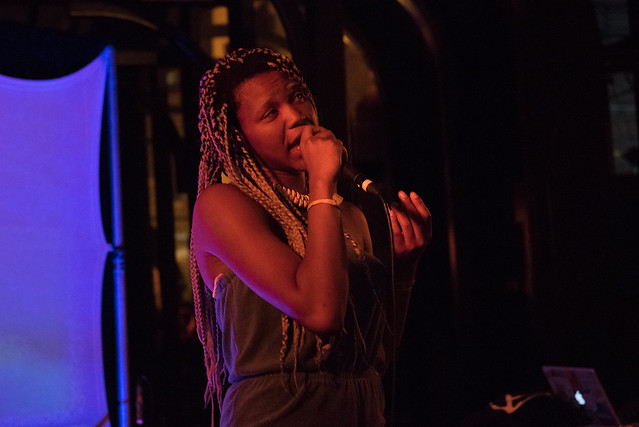
Was it something about the city specifically that brought your rap out of you?
I was finally out of school -- school was at times spirit-crushing. I met the loves of my life there, people that have helped me grow so much and that are so close to me, but being away from the real world and in this little bubble felt all wrong. I was lucky I had such freedom and choice when it came to my curriculum and that I was getting to write poetry all day and study and make films and read, but I didn’t feel very empowered there as an artist. I mean, for writing that’s almost good because you’re just kind of angsty and brewing and that’s great because you can just let it all out onto the page. But I couldn’t do much other than that part of it. I had no motivation to go out and try to read at places or perform at places or get into studios or get published. I’m just someone that had to wait until I was free to really put the plan into action. And even now I’m much better at the creating and performing part than the business side of things. But when I left school I felt that everything I did there, all the creating and the brooding and the shedding was but a preparation for what has started to happen for me since I finished school and came to Seattle to be with Raven.
You mention your mom on several tracks on Third Daughter; what is her relationship to your music?
She loves my music. She listens to it on repeat. She’s always been my biggest encourager when it comes to my writing and my poetry. I think it took her by surprise when she realized I was going to be a musician and not like some academic poet. It seems like that was what I was headed towards. But I just couldn’t really get down with that life. The academia, the repression, the pretentiousness, the fact that poetry is kind of having a boring moment these days. But she’s a deeply sensitive and creative person, she’s heavy and she understands the heaviness of life and the necessity of art and she’s always recognized the genius in me. I think she understood that I need a little bit of a louder voice, more of a splash. And that’s what I found in music. She’s also a brilliant writer and I think she connects with my writing and it makes her proud. I think it really does something for her to hear her child being so vulnerable and making these projects that are such big showings of my soul and my creative ability.
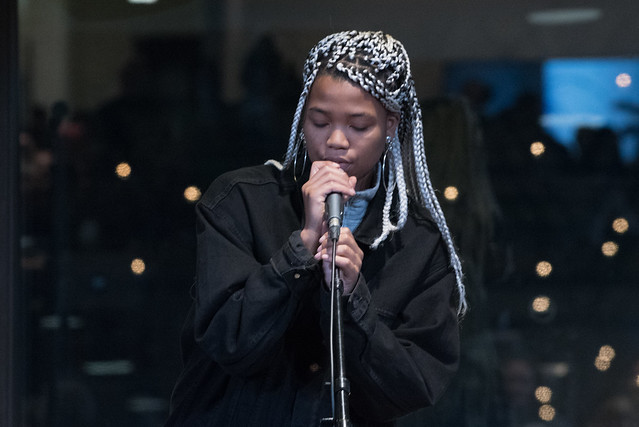
What’s changed in your life in the last year?
I’m not working a day job anymore. I went from working five days a week as a landscaper to working three days a week as a landscaper to working two days a week at a daycare to now not working at all. Except for doing shows and selling my music. So, that’s big for me.
What does it mean to have a partner like Raven along for your creative journey?
It means so much more than I can even understand at this point in the journey. Every day the meaningfulness of the story becomes more potent. We were just talking about it the other night. Raven and I meeting is undeniably cosmic work. Just a pure destiny thing. I think we both feel a little bit on the outside of things, strange and misunderstood. So it’s special for somebody like that to find a partner who understands and relates to your ways but is also sharing the experience of being an artist and trying to make a global and universal impact and sustain ourselves.
I don’t know that I could have started doing shows the way I did out here if Raven wasn’t doing it with me. At every cipher whatever one of us got the mic handed it to the other after they were done, every time. Every time I went up in an open mic, I knew Raven was about to go up after or vice versa. I was this young shy introverted person that had spent so much of my life being silent and here I was in a brand new city and I only knew one person and I was putting myself out there like that for the very first time. And although Raven grew up here, and was making music here since he was really young, this was his first time kind of stepping out into the greater scene, as a solo artist, so we were both like in this beginning stage of introducing ourselves to the world and we benefitted so much from having the other by our side. It gave us strength.
I like to watch a lot of documentaries about music legends and their lives and the tragedy of it all and so much of that seems to come from these people not having somebody that was truly and firmly standing with them through it all. Somebody who was there before everything changed, and thereafter. We’ve known each other for so long now and the life we are choosing is no joke for people as sensitive and vulnerable as we are. It’s going to be really tough sometimes. And I think there was a reason we found each other early so that we could embark on this major journey and survive it together. I feel like we’re going to be a crucial part of each other’s survival as things get bigger for each of us.
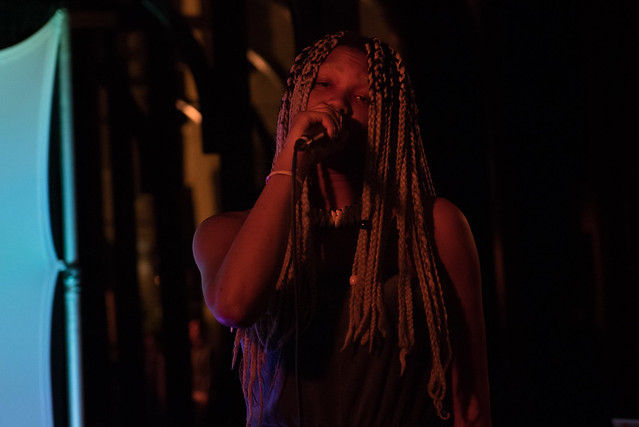
What fears do you have as your career grows?
One fear is that one day I’m going to wake up having entered an infinite creative block: I won’t be able to write or hear melodies, I won’t be inspired and I’ll never find a way out of that nightmare. That’s an irrational one, like the fear that somebody who’s been growing their hair out for years will one day wake up to somebody cutting it all off. Then there’s just that very real looming reality that the world stage and being on it is colossal. Everything about it, life- and mind-altering. It will be colossally amazing and affirming at times and crazy maddening and terrible at others. I will lose people, at moments I will lose myself. I will be inescapably visible and unable to turn back. I may have to fight to find authenticity at times, I might have to struggle against certain forces. Raven and I will struggle as we attempt to make sense of our stories in relation to one another. It will be harder than it is already for me to relate to some people. I will move further and further away from a safe cocoon and become more and more at the will of the universe and the collective. Slowly I will go from belonging to myself and my friends and my family to belonging to the entire world. In a way, it’s a sacrifice. These are all heavy things that can make me feel fear. But it’s all the price I have to pay to get to that moment, that maybe only .0001 percent of the population ever gets to, that moment when you are feeling no fear on the world stage and the entire world is being transformed because of it. Transforming the world with your freedom. I just always felt that I had to get to the center of the universe and radiate out.
Is there an aspect of your creativity that still surprises you?
Sometimes when I’m writing songs I feel like I’m grasping at straws, on an intellectual level at least. It usually doesn’t feel like I’m making sense. It doesn’t feel necessarily profound, I just try to listen for things, receive things, and then write them down. But by the time I’m done and I can sit with what I’ve written, I find that I’ve crafted this profound universe of thought. All of this subconscious magic was happening and it’s just so profound in the way that it relays an understanding of my story and my mind that I didn’t necessarily know I had such a grasp on. And all while I thought I was struggling to choose my words.
I think creators are conduits. For something that can only be accessed in that zone of making and being open. Sometimes it’s our subconscious and the lessons our lives were meant to teach the world. Sometimes it’s our ancestors. And sometimes those are all the same thing. I am the only person whose chosen to follow music at this point in my immediate family, but we have very musical genes. I have great uncles on both sides who were musicians. My great Uncle Kenrick “Snakehips" Johnson was actually decapitated while performing at the Café de Paris during a World War II bombing in London. My dad played the guitar and sang, he loved Soca and Calypso. I’m African and Caribbean, so that’s just in my blood. I know that I have ancestors that use the things I create as a way to interact with this world, too. It’s an honor to be able to hold that space for them.
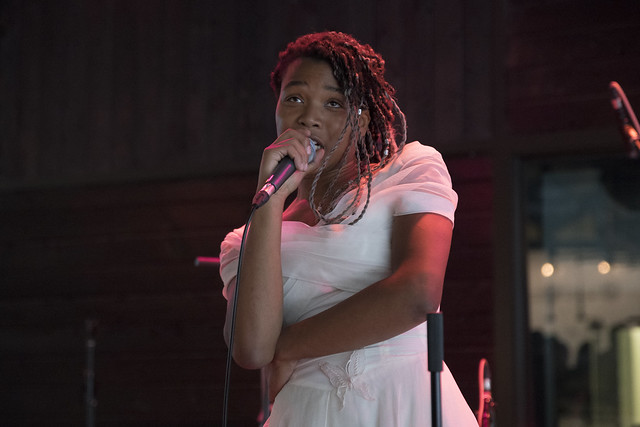
Is ‘experimentation’ a word you think about?
I experiment through indulging in my weird oddities. My uniqueness. I’ve tried to stop shutting down the things about myself that I don’t really understand or get ashamed or embarrassed of. Whether that’s like certain vocal inflections that I do or just paranoid thoughts about the intentions of the people around me. I experiment through trying not to filter myself. When I was first trying to write and record songs there was a lot of “no that sounds too weird, that doesn’t make sense, my voice is embarrassing, you can hear it cracking. Oh no, hide that! Hide everything vulnerable and human and raw.” So I just try to not go there as much and just try to let myself be myself, whoever I am in that moment. And that’s how I feel like I try to experiment. Not like I’m purposefully looking to do something weird necessarily but just listening to myself and allowing myself and accepting myself instead of being ashamed of letting things within me come out unpredictably and unexpectedly. It’s hard though. I’m still working on it.
What balance are you trying to achieve with your voice?
Rhythm is important to me and it’s in me. And I always have a lot of emotion in the way that I speak and the way I express. And I guess every time I’m on the mic, I’m just like, “I hope this is going to come out right.” And I pray really hard and I tense my stomach muscles. It’s unpredictable. My voice is unpredictable because I wasn’t trained and I don’t know how to balance my voice, I don’t know how to control it. So, it’s kind of like I’m not so much going for anything. Instead, I’m just trying to make it happen and see what happens. There’s been a lot of learning about my voice in the past few years. Sometimes I’ll be in one octave and then I’ll switch to another octave, kind of all over the place. So, yeah, I don’t know if I’m so aware of my vocal balance.
But there’s something about regression, about going back to who you are as a child that’s really important to me when I’m on stage. Freeing that inner child. You know how when you hear children talking to parents, telling them stories, there’s so much emotion in their voice? That’s how I feel when I make music. I feel that emotion, like that raw emotion of a child. It’s vulnerable but I’m trying not to be self-conscious about it and just kind of let it happen. I do have certain inflections, tones and octaves I gravitate toward. But I’m always just trying to emote with whatever I’m feeling in the moment.
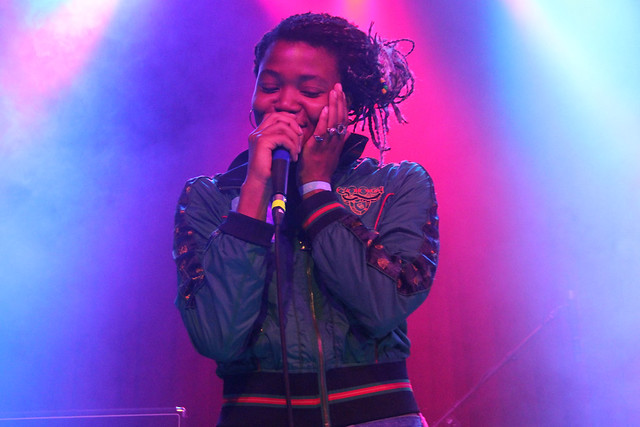
In the era of video and single releases, why drop a 19-song album?
I really just had so many songs that I wrote in between now and [my first LP], Jump Or Die. For whatever reason, it’s taken me to this point that I want to release singles. It really excited me to work on projects and present people with this package of things. That’s more fun for me than just releasing this singular song that is great -- like, ‘Cool song!’ I was more interested in giving people a cool thirty to forty minute experience. I like to have all the songs contextualize each other, so I just didn’t release anything in between Jump Or Die and Third Daughter. So by the time it got to the point where I wanted to put the project out, I had a little over 25 songs that I really liked and I chose 19 of them to record.
How much do you pay attention to the music scene?
I pay attention to the things that spark my interest. I’m on Instagram and I’m on Twitter and I like to think about the people who are gaining big followings on those sites. Musicians who are not only releasing music but who are also building these personas, building fan bases, connecting with their fans in really new ways. That just couldn’t happen 10-15 years ago; it didn’t happen. So I pay attention to that a lot. I feel like that’s a new frontier when it comes to being an artist: building yourself and connecting with your fans and showing them who you are and making all of that apart of the creative journey. So, yeah, there are a couple musicians, especially rappers, in the underground that I follow on social media. And then, of course, it’s not hard to keep up with the local scene in Seattle because it’s a lot of my friends and people I see all the time. But I don’t know, I’m very spacey. I shift between being really connected to stuff and interested in what’s happening with other people’s music and being really disinterested and focusing on what I’m doing. I’m always drawing influence though, from both new and old artists.
When you meet a fan you don’t know at a show, what goes through your head?
In those moments, I sometimes get this overwhelming sense that it’s very hard for people to express what they want to express to me and for me to express what it means to me for them to be expressing it. It’s hard to have the moment that we’d both like to have or imagine having. Some people understand that. They just come up and say that they love what I do and then go about their night. I really appreciate those people. I know they like my music and they want to have a genuine connection, but also they’re sensitive to the fact that we don’t know each other and we only have so much time. It just doesn’t feel like that setting is right all the time for building connections with fans. Although sometimes I do. I appreciate the people that listen to my music and come out to see me so much, I just fear that if there’s a big expectation, there might be disappointment. But I guess disappointment wouldn’t be that bad. Maybe that’s okay.
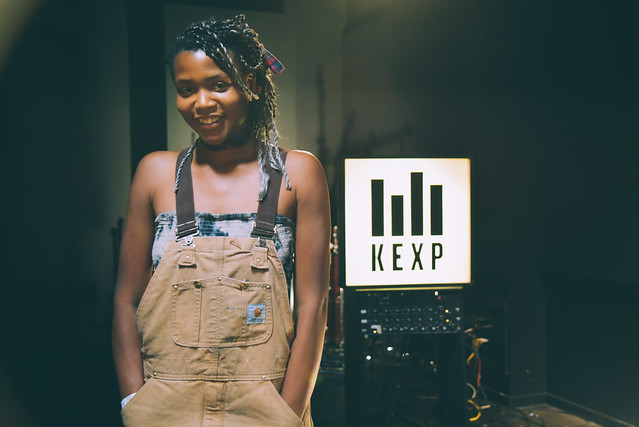
What interests you most about the idea of collaboration?
One way of collaborating with other artists that feels really good for me is just being there to encourage each other’s dreams. Like, scheming and dreaming together and being there for each other in times of doubt or struggle. I think that’s some of the most important collaboration that can be done. Just bearing witness to each other's commitment to pursuing this thing that is emotionally, physically, and mentally really hard to pursue. When you surround yourself with artists that you respect it means the world when they recognize the genius in you and the importance in what you do and let you know that. I mean we can be hard on each other and competitive but we're also some of the only people looking out for each other. It's the artists and it's the people or fans that are the only ones looking out for the average creative. If we give the people what they want, they look out for us. But then there are moments when we start wanting to give the people something they don’t know they want or need. Yet, and in those moments we rely on other artists to reassure us. Artists are always there for each other in times of experimentation and growth and trying new things. Most of the general population hated Kanye West's 808's and Heartbreak but every musician knows just how much it did for hip-hop and music, in general. And that’s how we support each other in pushing our crafts forward, how we push art forward and how we push the world forward.
I’m starting to work on making my own beats, but up until now, I’ve really relied on the producers I work with to give me music to write to. Usually, they just send me a beat and I make a song with it. Sometimes I’ve written a verse to perform on someone else’s track or they’ve written a verse to perform on mine. But that’s most of the collaboration I do. I’m still figuring out how to collaborate with people in a more involved kind of way. Other than Raven. I feel what I value about Raven is that he is such a free artist. He’s probably the most influential artist that I know because he teaches people to let go. He’s one of few artists I actually have gotten very comfortable working with and been able to learn a lot from. I have a lot of talented friends that I’ve done tracks with and that I would love to work with more at some point, but I mostly like to do my thing by myself. I have such a strong vision that when I bring other people into it inevitably feels like a compromise. Even when we make something really cool. It’s something I have to work through, I know there’s something holding me back from it and that there are rewards that come from working closely with others. Maybe one day I’ll figure it out. But for now, I prefer my friends just send me beats and I’ll write by myself and just create this whole world really independently. I have a very independent process. At some point in my career, I’d like to start learning more about the ways in which I can work with people and feel most comfortable. But for my whole life, it’s just been me alone in my bedroom, writing by myself. That’s what I like.
By Dusty Henry and Sharlese Metcalf
Throwaway Style is a weekly column dedicated to examining all aspects of the Northwest music scene. Whether it’s a new artist making waves, headlines affecting local talent, or reflecting on some of the music that’s been a foundation in our region; this space celebrates everything happening in the …
If you're wondering about the irresistibly funky house track behind the latest iPhone X ad, we've got you covered. KEXP recently spoke to Grammy-nominated, New York-based duo SOFI TUKKER, whose new song, "Best Friend," soundtracks the new Apple ad out last week. Before their Saturday night set at t…
Every week, KEXP features a new local artist with an interview and suggested tracks for where to start. This week we're highlighting Vancouver B.C.'s Woolworm, who performed last night at Pop Montreal, where KEXP is currently on site filming live sessions and doing interviews.